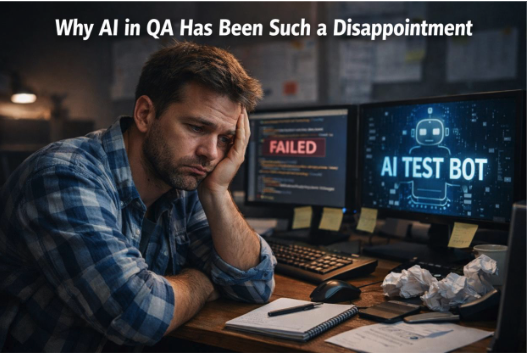Tag: AI

There is a quiet truth in enterprise QA right now. Many teams feel let down. For the last several years, vendors have promised an AI revolution in testing. Autonomous agents. Self healing frameworks. Copilots that would “change everything.” Yet when you talk to QA leaders privately, the story is different. Productivity has barely moved. Script

APIs are the backbone of modern software. From microservices and mobile apps to cloud platforms and third-party integrations, APIs power nearly every critical interaction in today’s applications. Yet for many QA teams, API testing remains slow, manual, and incomplete—often treated as a separate effort from UI testing, or skipped altogether under delivery pressure. In an

As applications grow more complex, traditional test automation is struggling to keep up. Modern systems are dynamic, interconnected, and constantly changing—yet many QA teams still rely on brittle scripts tied directly to the UI. Every UI change triggers maintenance. Every new workflow requires rework. The result is slow testing, limited reuse, and quality that can’t

Healthcare software operates under one of the most demanding regulatory environments of any industry. From HIPAA and HITECH to CMS, FDA, and state-level mandates, compliance is not optional—and neither is speed. At the same time, healthcare organizations are under pressure to modernize digital experiences, integrate AI, and release software faster to support better patient outcomes.

Enabling Secure, High-Frequency Releases Across Mobile, API, and Web Banking Applications Digital banking has become the primary channel for customer engagement. From mobile check deposits and real-time payments to account management and personalized offers, banks are expected to deliver flawless digital experiences—securely and continuously. Yet as release frequency increases, traditional QA approaches struggle to keep

Accelerating Guidewire-Based Policy, Claims, and Billing Systems with AI-First Testing The insurance industry is under unprecedented pressure to modernize. Digital-first customers expect seamless policy issuance, real-time claims processing, and error-free billing—while regulators demand strict compliance, auditability, and data integrity. At the center of this challenge sit complex core systems like Guidewire, which power policy, claims,

And Why Appvance Leads the AI-First QA Revolution For decades, software testing has lived in the shadow of development—manual, repetitive, and notoriously slow to evolve. Even as engineering teams embrace generative AI to write code in seconds, QA has remained anchored to scripting tools, recorders, and frameworks that depend on human effort. Generative AI is

For decades, QA automation has relied on human-created scripts, recorders, and manual maintenance. Even with assistive AI sprinkled into legacy tools, the burden has stayed the same: people must still author, update, and debug test cases one by one. That model simply cannot keep up with modern software velocity. With Appvance IQ (AIQ), AI becomes

For more than a decade, the test automation story has been the same: pick a tool, point a recorder at your app, “capture” user flows, and generate scripts. Tools like Tricentis, Katalon, and even script-heavy frameworks like Playwright promise faster automation by making script creation easier. In practice, they’ve created something else: script debt. Every

Every software company today seems to claim they’re “powered by AI.” But when you peel back the layers, most tools are little more than recorders with a marketing makeover. In software testing, where precision, scalability, and speed actually matter, not all AI is created equal — and Appvance IQ (AIQ) proves it every day. Appvance